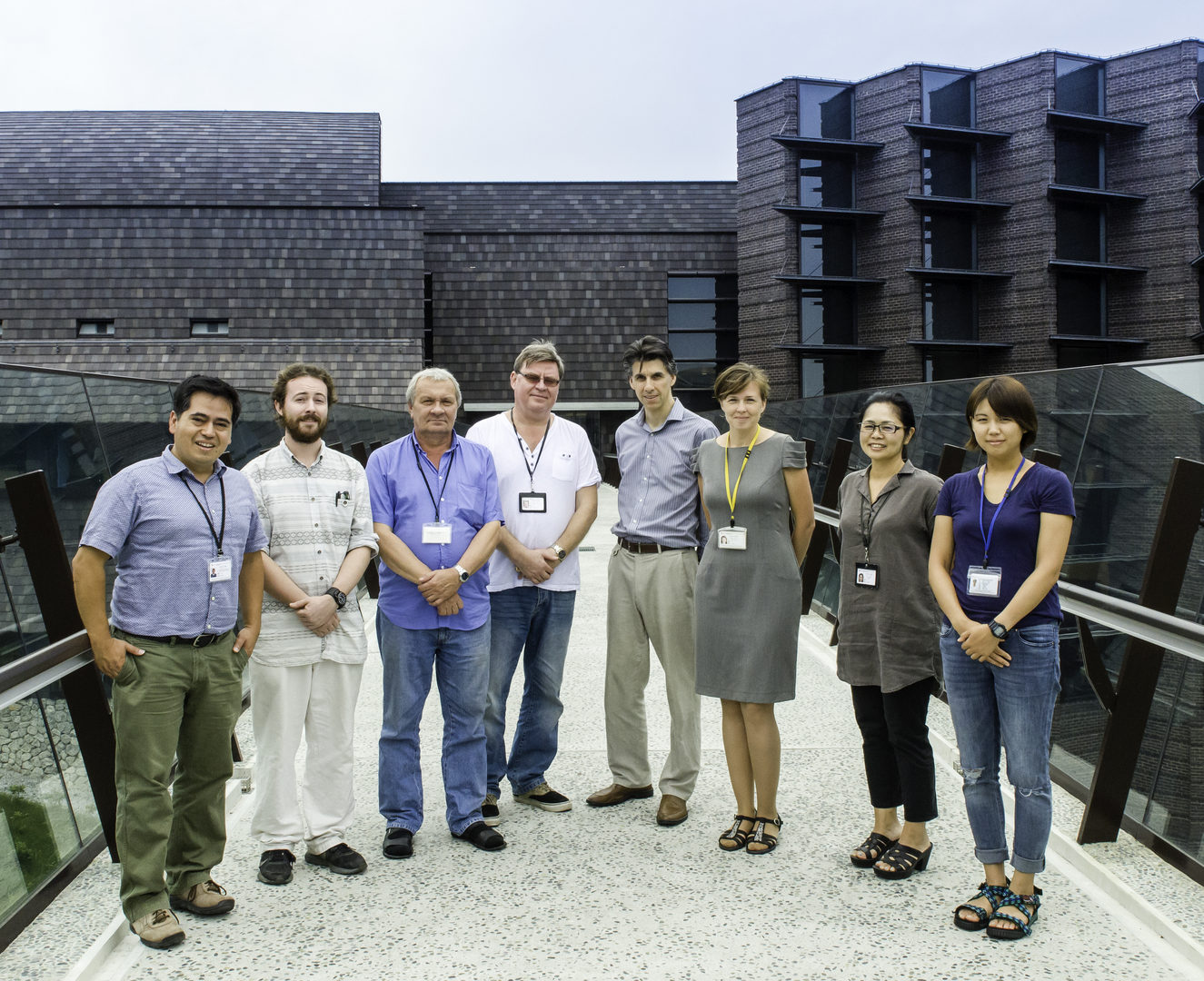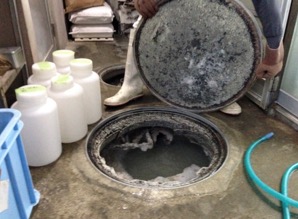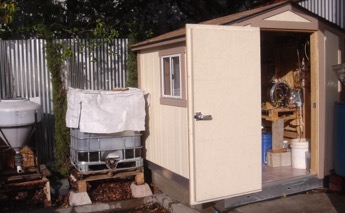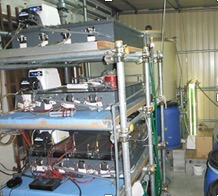FY2015 Annual Report
Biological Systems Unit
Professor Igor Goryanin

Abstract
Our research in the Biological Systems Unit focuses on wastewater treatment applications for microbial fuel cells (MFCs). Within MFCs complex interactions between microbial populations result in removal of organics and generation of electricity. We seek to understand and manipulate these interactions so as to improve MFC performance characteristics. For instance, differences in anode community composition, as determined by metagenomic sequencing and analysis, are monitored with the ultimate goal of building idealized communities for treatment of specific substrates. In FY2015 we have added the third 60 L pilot scale MFC to our third year collaboration with a local awamori distillery to increase our treatment capacity and establish automatic monitoring system. In addition, we have newly designed and developed tubular-style MFC and started to treat local tofu wastewater in Okinawa and wine wastewater in California, USA. This will allow us to compare the new technology to our current tray-type technology on organic removal as well as cost effectiveness using various agro-industrial wastewaters
1. Staff
- Dr. Michael Cohen, Group Leader
- Dr. Larisa Kiseleva, Researcher
- Dr. Slava Fedorovich, Researcher
- Dr. Jovan Rebolledo Mendez, Researcher
- Dr. Lukasz Szydlowski, Postoctoral Fellow
- Mr. David Simpson, Technical Staff
- Mr. Geoffrey Schaffer-Harris, Technical Staff
- Ms. Olga Tsoy, Research Intern
- Mr. Ignat Goryanin, Research Intern
- Ms. Shizuka Kuda, Research Unit Administrator
2. Collaborations
- Theme: Microbial Fuel Cell deployment for treatment of tofu wastewater
- Type of collaboration: Industrial Promotion
- Create-ES Co., Ltd. (construction)
- OP Environment Science Center (analysis)
- Researchers:
- Professor Hideo Yamasaki, Faculty of Science, University of Ryukyus, Okinawa, Japan
- Theme: Biology of Microbial Fuel Cells
- Type of collaboration: Joint research
- Researchers:
- Professor Anatoly Sorokin, Institute of Biophysics, RAS, Pushchino, Russia
- Professor Mikhail Gelfand, Institute for Information Transmission Problems, RAS, Russia
- Theme: Improvement of Microbial Fuel Cell performance using nanotechnologies
- Type of collaboration: Joint research
- Researchers:
- Professor Mukhles Sowwan, Nanoparticles by Desighn Unit, OIST
- Theme: Microbial Fuel Cell treatment of whisky distillery wastewater
- Type of collaboration: Joint research
- Researchers:
- Professor Alan Harper, Heriot Watt University, Edinburgh, UK
- Theme: Microbial Fuel Cell treatmenet of winery wastewate
- Type of collaboration: Joint research
- Researchers:
- Prof. Prof. Farid Farahmand, Department of Engineering Science, Sonoma State University, California, USA
3. Activities and Findings
3.1 Development of electrogenic communities in swine wastewater-fed microbial fuel cells
The rapidly growing pig farming industry generates high-strength wastewater containing organic compounds, ammonia, phosphates, odorous gases, suspended solids, and pathogens. Treating swine wastewater is especially difficult where land is limited and pig farming facilities occur in close proximity to population centers, such as in Okinawa. The lack of available land for application of swine wastewater as a fertilizer and potential for contamination of surface and ground water sources underscores the need to employ through treatment of swine wastes.
Microbial fuel cells (MFCs) can be promising technology for swine wastewater treatment since the presence of volatile fatty acids (VFAs) in this substrate can increase the electrogenic performance of anodic biofilm and remove noxious odor.
One important determinant of MFC reactor performance is the composition of the microbial community in the anodic chamber. In this study we aimed to determine a more efficient initial inoculum for swine wastewater treating MFCs among beer waste-digesting anaerobic sludge and swine wastewater sludge.
Our research demonstrated the importance of inoculum source in formation and performance of anodic biofilms in microbial fuel cells that treat swine wastewaters.
3.2 Awamori distillery wastewater treatment with field-scale microbial fuel cells
In addition to two pilot-scale MFCs (60 L active volume and 8 electrode pairs each) that have been operating at Mizuho awamori distillery for two years, a third bioreactor of similar design was constructed and installed at the same location. An automatic real-time monitoring of electrical power output, pH and COD rates was established for each bioreactor.
Previously collected microbial communities from both anodic surfaces and planktonic phases were sequenced and partially analyzed. Also, the new samples of 18 months MFC operation point were collected for isolation and analysis of microbial nucleic acids.
Fig. 1. Three pilot-scale MFCs at Mizuho Awamori Distillery in Naha, Okinawa
3.3 Treatment of tofu wastewater with tubular microbial fuel cells
Based on our promising results generated by ongoing research distillery pilot scale Microbial Fuel Cells, the Goryanin Unit applied for and received an Okinawa Prefecture Grant, in conjunction with local Okinawan companies Create-ES and Okinawa Prefecture Environmental Science Centre. The purpose of the project is to investigate Tofu wastewater as a substrate to treat and generate power from using MFC.
As part of the project, we will be trailing a newly developed MFC architecture which has the potential to lower module costs and increase volume throughput whilst maintaining comparable power production to our current unit technology design.

Fig 2. Sampling of Tofu wastewater from underground collection tank.
3.4 Treatment of wine wastewater with tubular microbial fuel cells
Wastewater treatment can be a major cost for wineries. We are investigating application of MFC technology as an energy-saving substitute for winery wastewater aeration. In 2015 we began a collaboration with the research groups of Profs. Michael Cohen and Farid Farahmand at Sonoma State University, California to construct and test the performance of a demonstration MFC system at D’Argenzio Winery. The entire system consists of a 1000-L anaerobic digestion/pH stabilization tank, a novel 50-L tubular MFC, and a sand filter for removal of residual nutrients in the MFC effluent. We are monitoring current, voltage, pH and removal of chemical oxygen demand. Our goal is to eventually treat and reuse all of the wastewater produced at the site for irrigation.

Fig 3. The winery wastewater treating system in Santa Rosa, California
4. Publications
4.1 Journals
- Kiseleva L, Garushyants SK, Ma H, Simpson DJ, Fedorovich V, Cohen MF, Goryanin I. (2015) Taxonomic and functional metagenomic analysis of anodic communities in two pilot-scale microbial fuel cells treating different industrial wastewaters. J Integr Bioinform, 12(1):273, 2015;
- Kiseleva L, Briliute J, Khilyas IV, Simpson DJ, Cohen MF, Goryanin I. (2015) Magnet-facilitated selection of electrogenic bacteria from marine sediment. BioMed Res Int, 2015:Article ID 582471
- Kiseleva L, Garushyants SK, Briliute J, Simpson DJ, Cohen MF, Goryanin I. (2015) Genome sequence of the electrogenic petrolium-degrading Talassospira sp. Strain HJ. Genome Announc. 2015:3(3) pii: e00483-15. doi: 10.1128/genomeA.00483-15.
4.2 Books and other one-time publications
Nothing to report
4.3 Oral and Poster Presentations
- Cohen MF. Application of Microbial Fuel Cells for Recycling Distillery and Winery Wastewaters. CSU Water Resources Policy Initiatives Annual Meeting, Fresno, CA, April 9 (2015).
- Garushyants, S., Kiseleva, L., Ma, H., Simpson, J.W., Fedorovich, V., Cohen, M., Goryanin, I. Comparative metagenomic profiling of two pilot-scale microbial fuel cells treating industrial wastewaters. Poster presentation, Moscow Conference of Computational Molecular Biology, Moscow, Russia, July 16-19 (2015).
- Tsoy, O., Kiseleva, L., Goryanin, I. Microbial composition and metabolic potential development in microbial fuel cells during wastewater treatment. Poster presentation, Moscow Conference of Computational Molecular Biology, Moscow, Russia, July 16-19 (2015).
- Kiseleva, L., Garushyants, S., Ma, H., Simpson, J.W., Fedorovich, V., Cohen, M., Goryanin, I. Taxonomic and functional metagenomic analysis of anodic communities in two pilot-scale microbial fuel cells treating different industrial wastewaters. Oral presentation, NETTAB&IB, Bari, Italy, October 14-16 (2015).
5. Intellectual Property Rights and Other Specific Achievements
Nothing to report
6. Meetings and Events
Nothing to report
7. Other
Nothing to report.




